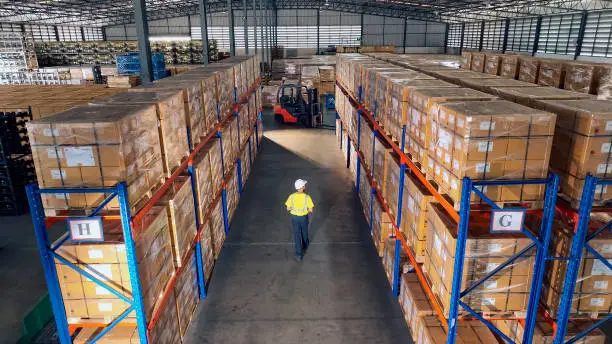
Can Solar Panels Catch Fire? What Businesses and Property Owners Should Know

Why You Should Clean Your Solar Panels Every Year


Supply chain disruptions are a critical business concern in today’s interconnected global economy.
The repercussions of the pandemic and the impact of international conflict continue to disrupt, while political changes in the UK and abroad cause uncertainty in the supply chain.
As supply chain specialists, we deal with all types of disruptions and know how to overcome operational challenges, big or small.
In this article, you’ll learn how to identify the causes of supply chain disruptions and practical solutions to overcome them.
Regional, national, and international factors can cause supply chain disruptions.
From global concerns to local logistics, the primary drivers include:
Although we’re still feeling the impact of Covid-19, the pandemic isn’t the only health concern to consider.
From Bird Flu causing the culling of 1 million hens and the USA’s withdrawal from the World Health Organisation in January 2025, global health crises can arise anytime.
While public health measures like lockdowns and business closures remain possible, labour shortages and inventory bottlenecks are never far away.
Widespread delays and shortages can cause increased product demand, putting further strain on global supply chains, like they did in 2020.

Tariffs, export restrictions, and sanctions caused by geopolitical disputes have prompted many businesses to reconsider their sourcing strategies.
For example, the tariffs Donald Trump is expected to impose on foreign goods entering Nth America will drive the reciprocation of tariff fees and product price inflation which will ultimately drive the cost of global goods up and could drive firms to consider supply chain trading with different regions.
Ongoing conflicts in Europe and the Middle East can cause cancelled orders, delayed shipments and port congestion.
Meanwhile, Russia’s position as a major exporter of oil, industrial metals and fertilisers has led to a shortage of these essential materials.
Whether geopolitical tension reduce or increase during 2025 remains to be seen.

As the recent Great Los Angeles wildfires show, natural disasters wreak havoc on the affected community and cause supply chain chaos.
As well as displacing residents and pushing local resources to their limits, storms, hurricanes, floods and fires can cause power outages, evacuations, road closures and gridlock.
Whilst protecting human life is the priority, the damage to critical infrastructure can halt production and distribution, interrupting the flow of much-needed supplies and equipment.
For example, the damage inflicted by Hurricane Helen on Baxter International led to significant shortages in medical supplies.

Strikes and labour shortages can impede supply chain operations at any time.
Recent strikes at ports such as Felixstowe led to substantial disruptions. Striking dockers at the UK’s largest container port forced JD Sports Fashion Plc to reroute containers through alternative ports, including Southampton, London Gateway, and Rotterdam, to avoid delays.
Chief Financial Officer Neil Greenhalgh said that even minor delays can be significant, particularly for time-sensitive product launches.

Congestion at major ports and airports causes shipping delays and transportation inefficiencies, ultimately leading to supply chain disruptions.
Incidents like the Suez Canal blockage create ripple effects across international trade.
Handling about 20% of global container shipments, the Suez Canal generated around $9.4 billion in revenue in 2023. However, since November 2023, maritime traffic in the canal has faced significant disruptions due to geopolitical tensions and attacks in the Red Sea region.
Consequently, the canal’s revenues fell by 50% year-over-year in January 2024, amounting to a loss of almost $375 million compared to January 2023.

Any business relying on a single supplier or region faces increased risk due to the lack of redundancy in their supply chain. This vulnerability can lead to disruptions from unforeseen events like political instability, natural disasters, and labour shortages.
As such, businesses should diversify their supplier base to work with sources in various locations, reducing dependency on any single supplier.
Jigsaw Business Group can identify and mitigate weaknesses in your supply chain to enhance transparency and reduce risks.

Advanced analytics afforded by digital tools offer real-time supply-chain visibility.
Adopting new technologies like AI and machine learning can help you speed up processes, manage disruptions and predict risks. These increased efficiencies leave you free to manage your teams and focus your attention where it’s most needed.
Digital tools such as our Jigsawsafe™ app can be seamlessly incorporated into your business operations to transform business practices and revolutionise your supply chain.

While stockpiling products may seem counterintuitive, maintaining higher critical inventory levels can protect against supply shortages.
Although this approach may increase holding costs, it ensures continuity during disruptions.
IKEA, for example, has implemented strategic stockpiling to mitigate supply chain disruptions. By maintaining higher inventory levels and sourcing materials locally, the company can continue operating despite global crises.
This approach has helped IKEA invest more than £117 million in lowering prices for their customers, driving impressive online growth in the process.

Manufacturing your product closer to the end consumer has several advantages, including:
Additionally, localised production lowers transportation costs and shortens delivery times, making your product more affordable and desirable.
With the growing consumer preference for sustainably sourced, regionally produced goods, working with nearby partners will promote local economic development and strengthen supply chains.
This approach can lead to long-term, sustainable growth.

Working with logistics partners can significantly improve your organisation’s communication and coordination.
Collaborating with supply chain experts like Jigsaw Business Group can increase efficiency and cost-effectiveness across your supply chain, even during the most challenging times.
Our tailored approach to your project includes everything from the initial diagnostic study to full implementation.
With a track record in supporting clients worldwide with global supply chain concerns, our team are well-known for delivering exceptional practical solutions.
